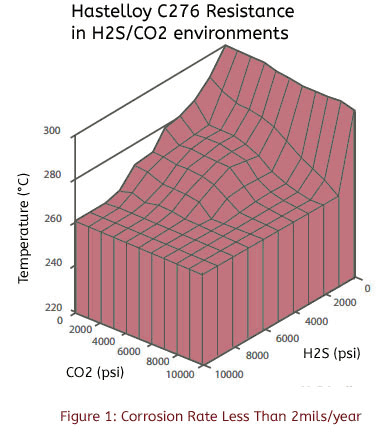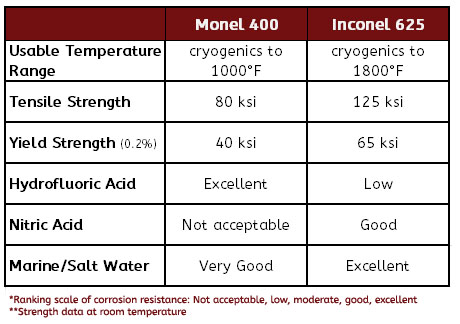Not sure what material is best for your application?
Contact an Expert
Search By Material
Search By Application
Tag Archives: hastelloy C2000
Posted on January 26, 2018 by dean
Q: I’m running a chemical cleaning process on stainless steel to remove the oxides and to enrich the chromium depleted areas again surface. It’s an acid pickling process, where mixtures of hydrofluoric acid (HF) and nitric acid (HNO3) are used. I’ve tried Hastelloy C276 bolting on my tanks because I thought … Continue reading →
Posted in Application, Corrosion Resistance, FAQs, Specialty Metal Fasteners, Technical Questions | Tagged Alloy 400, Alloy C2000, bolts for acid pickling, bolts for HF, bolts for hydrofluoric acid, bolts for nitric acid, bolts for steel pickling, fasteners for acid pickling, fasteners for HF, fasteners for hydrofluoric acid, fasteners for nitric acid, fasteners for steel pickling, hastelloy C2000, Monel | Leave a comment
Posted on January 22, 2018 by dean
Q: I’m using HCl in a pickling process and have used Hastelloy C276 bolts to protect my equipment but am still having corrosion issues. Any ideas? A: In pickling processes ferric chloride is created which is a strong oxidizer and most pickling process are at elevated temperatures – Hastelloy C276 … Continue reading →
Posted in Application, Corrosion Resistance, FAQs, Material, Specialty Metal Fasteners, Technical Questions | Tagged Alloy C2000, Alloy C276, Hastelloy, Hastelloy Bolts, hastelloy C2000, Hastelloy C276, Hastelloy Screws, HCl, HCl Corrosion, Hydrochloric Acid, hydrochloric acid corrosion, Hydrochloric acid resistance, steel pickling | Leave a comment
Posted on September 29, 2017 by dean
 Oilfields are subjected to a diversity of corrosive elements including carbonic acids, sour gas (H2S), and fracking/stimulant acids such as hydrochloric and hydrofluoric acid. Naphthenic acids and simple organic acids are also found in crude oil extraction. In conjunction to acids, these environments contain sand and other abrasive elements which … Continue reading →
Oilfields are subjected to a diversity of corrosive elements including carbonic acids, sour gas (H2S), and fracking/stimulant acids such as hydrochloric and hydrofluoric acid. Naphthenic acids and simple organic acids are also found in crude oil extraction. In conjunction to acids, these environments contain sand and other abrasive elements which … Continue reading →
Posted in Application, Blog, Corrosion Resistance, High Strength, High Temperature Resistance, Specialty Metal Fasteners | Tagged fracking corrosion, Hastelloy, hastelloy C2000, Hastelloy C276, Hydrochloric Acid, Hydrochloric acid resistance, Hydrofluoric acid, Incoloy, Incoloy 825, Incoloy 925, oil & gas corrosion, Oil Corrosion, sour gas, sour gas well, sulfur corrosion, Sulfur corrosion resistance, sulfur-induced stress cracking | 1 Comment
Posted on July 25, 2017 by dean
 Hastelloy alloys have long been the gold standard of corrosion resistant bolts; only out performed by metals like Zirconium and Tantalum. This family of high performance nickel alloys can handle strong acids like hydrochloric, sulfuric, acetic, formic and phosphoric acids, yet each grade actually exhibits its own strengths in dealing with specific acids and niche environments. … Continue reading →
Hastelloy alloys have long been the gold standard of corrosion resistant bolts; only out performed by metals like Zirconium and Tantalum. This family of high performance nickel alloys can handle strong acids like hydrochloric, sulfuric, acetic, formic and phosphoric acids, yet each grade actually exhibits its own strengths in dealing with specific acids and niche environments. … Continue reading →
Posted in Blog, Material, Specialty Metal Fasteners, Uncategorized | Tagged Alloy B3, Alloy C2000, Alloy C22, Alloy C276, Boiling Acid, Corrosion, H2SO4, Hastelloy, Hastelloy B3, hastelloy C2000, Hastelloy C22, Hastelloy C276, HCl, Hot Acids, Hydrochloric Acid, nickel alloys, oxidizers, Oxidizing, Sulfuric Acid | Leave a comment
Posted on May 11, 2017 by dean
 They rhyme, are both used in extreme environments, and are both nickel metal alloys, but Monel and Inconel are actually very different. But how? Let’s start with basic chemistry. Monel is a nickel-copper alloy and Inconel is a nickel-chromium alloy. So what does that mean for your extreme application? We … Continue reading →
They rhyme, are both used in extreme environments, and are both nickel metal alloys, but Monel and Inconel are actually very different. But how? Let’s start with basic chemistry. Monel is a nickel-copper alloy and Inconel is a nickel-chromium alloy. So what does that mean for your extreme application? We … Continue reading →
Posted in Application, Blog, Corrosion Resistance, High Strength, High Temperature Resistance, Specialty Metal Fasteners | Tagged Alloy 400, Alloy 625, Corrosion, hastelloy C2000, High Temperature, Hydrofluoric acid, Inconel, Inconel 625, Monel, Monel 400, saltwater corrosion, sea water corrosion | 1 Comment
